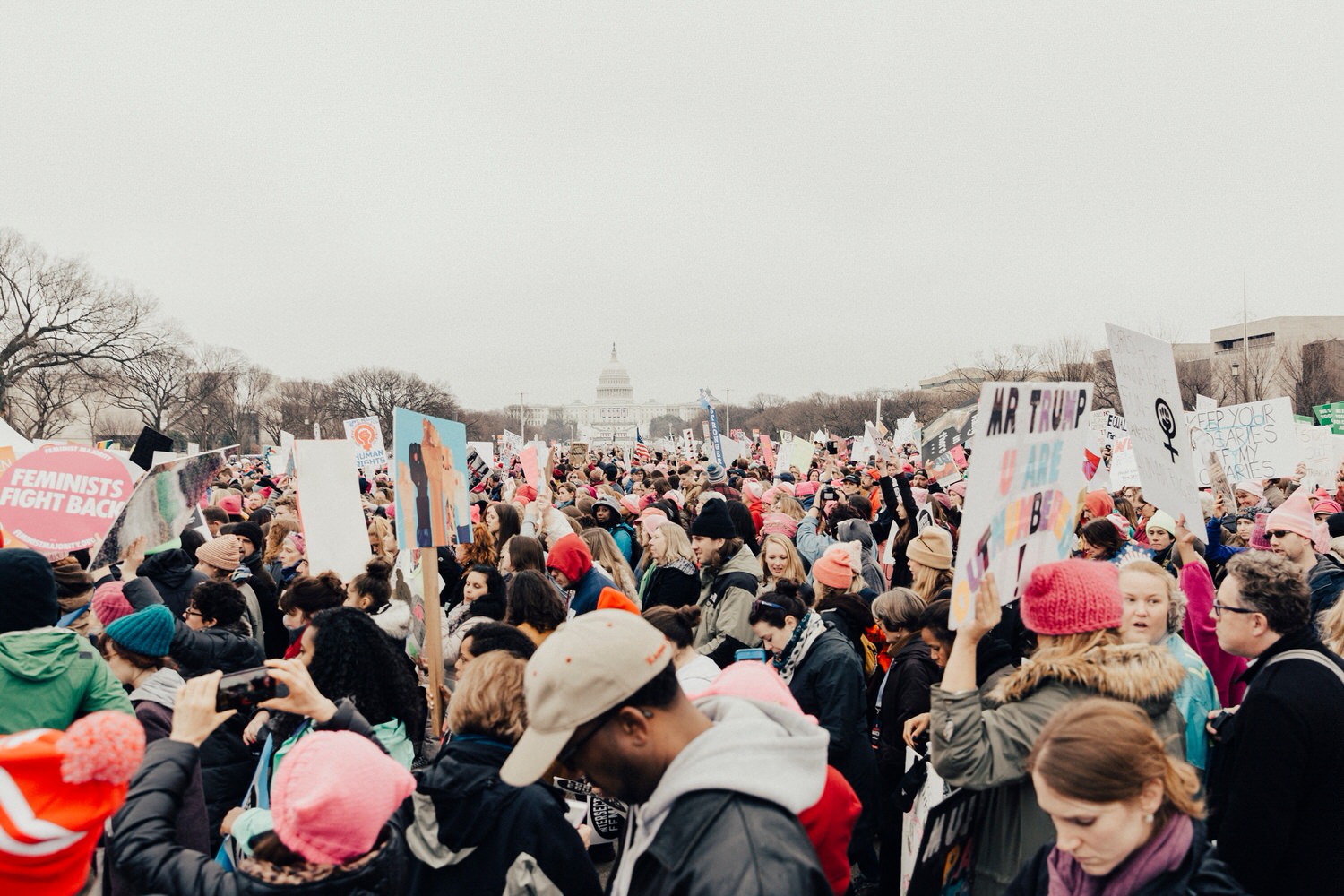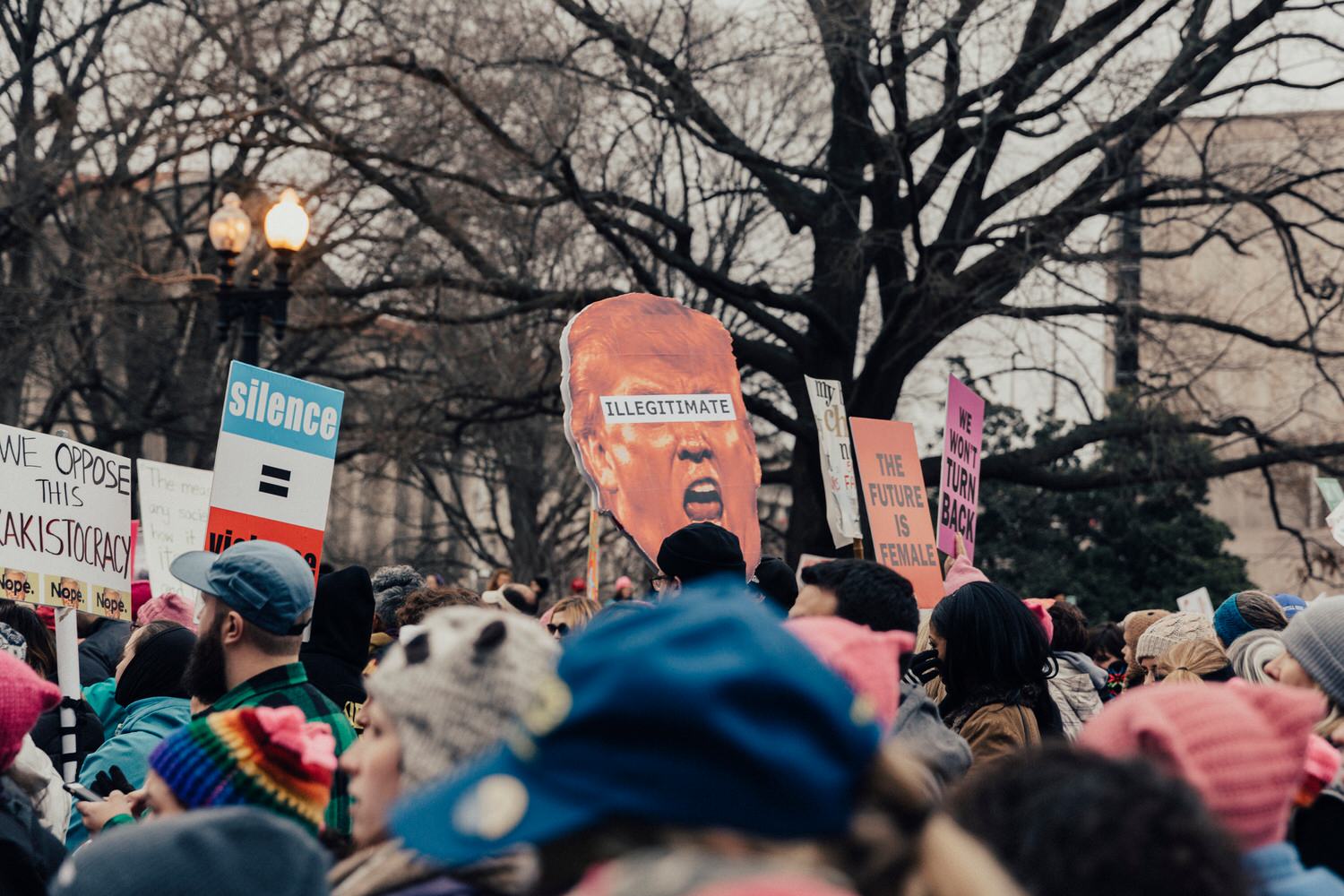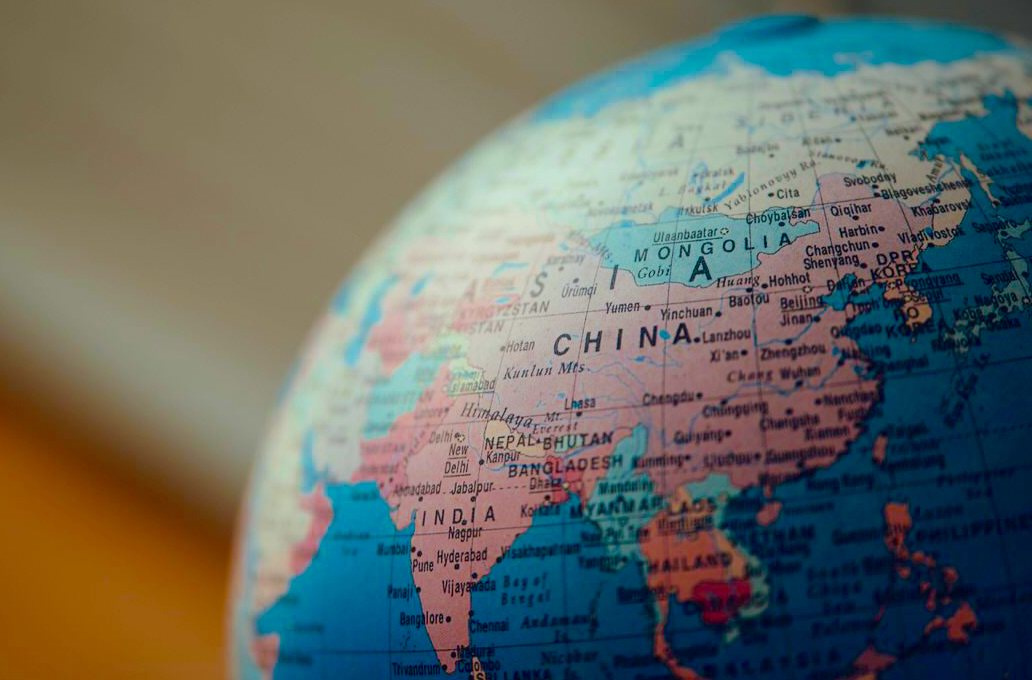The Road to Trumpsville1 : The Long, Long Mistreatment of the American Working Class
by Jeremy Grantham, GMO LLC
An extraordinary, large exit poll run by Reuters/Ipsos in which 45,000 people participated took place in the early evening on election day in the US. To say this was a detailed poll is an understatement. The spreadsheet for each question in small print runs the length of a generous dining room table, 11 feet! It will tell you how the American Hindu sample of 172 voted. The poll’s early results of 9,0002 inputs also revealed on the night before the election, when the bookies’ odds3 against Trump were 5 to 1, that the odds were wrong. The critical statement polled, in my opinion, was this: “America needs a strong leader to take the country back from the rich and powerful.”
From my perspective, the pushback against the rich and powerful for several decades has been very unexpectedly wimpy. “Occupy Wall Street” aside, the average voter had sat still for a series of major tax cuts for the higher tax brackets and on capital – capital gains and dividends. The lowerincome workers had paid the cost of outsourcing and labor-saving technology but had received no material help, while corporations and corporate officers and owners were the beneficiaries. In fact, money spent on worker training and education declined relative to foreign competitors. This shows up clearly in declining educational standards where today the US global rank is, to be friendly, mediocre. Most scarily in this regard, the average Chinese 20-year-old now ranks 2 full years ahead of his American counterpart in math proficiency! So, all in all, we can say that global forces pushed wages down and politics pushed them deliberately lower. The combined result is shown in Exhibit 1: The share of GDP going to labor hit historical lows as recently as 2014 and the share going to corporate profits hit a simultaneous high. Similarly, Exhibit 2 shows that the share of all income going to the top 0.1% rose well beyond any previous record and approached 100% of all the recovery in total income since the lows of 2009!
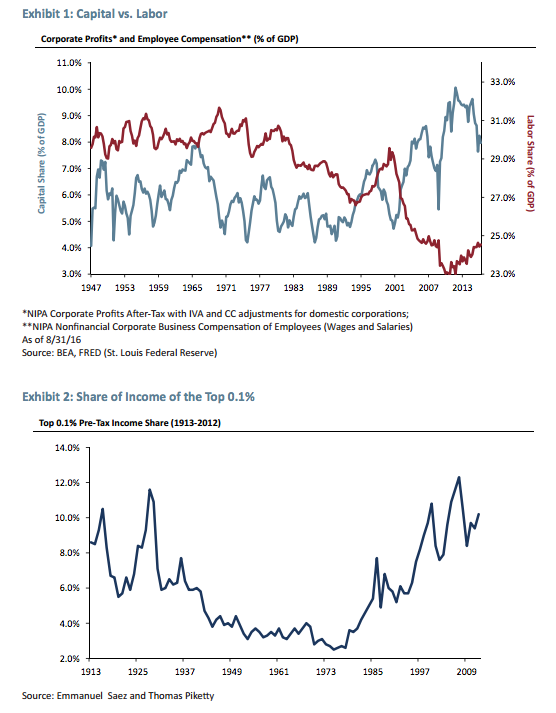
The “rich and powerful” not only increased their share of income and capital at an unprecedented rate in recent decades, but they also increased their grip on politics through a rising tide of political spending, including lobbying and the new Super PACs, courtesy of the Supreme Court’s ruling in Citizens United. Even before this ruling, Princeton University Professors Gilens and Page had reported4 on the complete lack of influence that voter opinion had on the probabilities of any bill passing through Congress. If favored by the public the average 31% chance of passing rose to a dizzying 32%. If not favored, it fell to 30%, justifying the nickname given to the influence of the average citizen: “Gilens’ Flatline.” When favored by the richest 10%, bills passed at a 65% rate – there is inertia after all. But when opposed by the wealthier and supported by inertia, the passing rate was essentially nil. Those hoping that there is any life at all left in representative democracy have to hope that some critics of this work are right when they claim that the data is complicated to sort out and the conclusions may be overstated. Anecdotal evidence on such issues as the minimum wage and gun laws, though, suggests that majority opinion is, shall we say, easily offset. Scarily, Gilens’ work does not include the post Citizens United data on political spending that is shown in Exhibit 3. I could not resist throwing in political contributions from unions, which are often cited by right-wingers as somehow balancing the books. And once upon a time they did. But, as unions have been severely weakened by the same combination of global forces and politics previously described, political contributions from unions have become a rounding error, offsettable by a mere handful or less of billionaires.
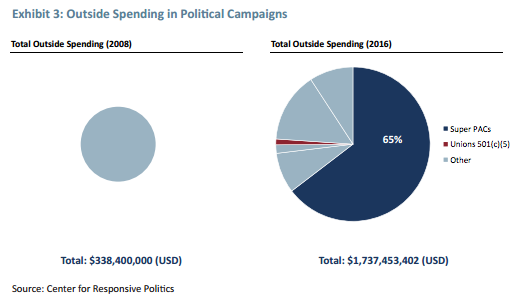
The Citizens United ruling reminds me of what a good ally of the “rich and powerful” and corporatism the Supreme Court’s majority has recently been, particularly in its strange assumption that corporations are human and deserve the same constitutional protections as we humans. It turns out, though, that humans are quite often cooperative and altruistic for no apparent self-advantage. Corporations, tied as they are these days to the single-minded goal of profit maximizing, seem to be close to saying that altruism, or the common good, when it compromises profitability, is a dereliction of their duty. In a human this would be considered pathological. (I wonder what the Founding Fathers would really have thought of this odd idea of corporate humanity. Or the equally odd idea that unlimited spending by corporations on elections is the moral equivalent of free speech.)
It is data like this that has led me over the last 10 years to believe that this country does indeed need to be saved from “the rich and powerful”; to believe that corporate interests were coming to dominate the public good; to believe that when in conflict corporations would, perhaps under the usual career risk pressure we all know so well, choose short-term profit maximizing over the well-being of workers. Nowhere was this better demonstrated than in their dispensing with the jewel in the crown of the old social contract, the defined benefit plan. This was done on the stated grounds of unaffordability even as corporate profits hit unprecedented high levels of GDP. Pensions that guaranteed a share of final salary were always going to be expensive and in hindsight we should perhaps consider it remarkable that it was ever voluntarily done at all…a testimonial to the old days when labor, cities, and countries of origin were also considered to be stakeholders of corporations. Worse yet, when deciding between their grandchildren’s well-being in a climate-controlled world or maximizing profits in a climatedamaging world, so far at least, they have collectively chosen short-term profits. In fact, the erosion of democracy began in earnest in the mid 70s when Senator Lawton Chiles (D. Florida) began his successful crusade to shine light in the dark places of government. His “Government in the Sunshine” legislation opened the door to vastly more effective lobbying by those with the means to pay, because the spotlight his legislation cast on government work, such as Committee mark-ups of Congressional bills, enabled lobbyists to pay fully only for loyalty they could actually observe.
The data on rising inequality also led me to check what others had thought and written on this issue and made me realize that a self-destructive streak in capitalism had been well-noted in the past. A particular surprise to me was Schumpeter – he of “creative destruction fame” – who believed capitalism in its current form would eventually fail through overreaching, using its increasing power to dispense with regulations designed to protect the public good (that has a painful echo today doesn’t it?) until pushback FDR style (or Teddy Roosevelt style) results in a more controlled mix, which Schumpeter called socialism. There was also a suggestion in his work and that of Keynes that excessive corporate power would weaken the demand from ordinary workers and hence weaken the economy. This last point is also emphasized more recently by Mancur Olson, who argued that “Parochial cartels and lobbies tend to accumulate over time until they begin to sap a country’s vitality. A war or some other catastrophe sweeps away the choking undergrowth of pressure groups,” as The Economist rather eloquently summarized his thinking in his obituary of March 1998.
To promote a pushback against excessive corporatism (and elements of oligarchy) one needs first of all to recognize the problem. Given the rather apathetic response from what used to be called “the workers” to the last 30 years of relative slide, there appears to have been no such recognition. But then on the eve of the election I realized that the point had finally been made. For an astonishing 75% of those first 9,000 polled agreed that, yes, we did indeed need to be saved from the rich and powerful. From now on, in my opinion, we live in a different world from the one we grew up in. A world in which a degree of economic struggle between the financial elite, perhaps 10% but more likely 1%, and all the rest is finally recognized. The wimpy phase is probably over. The question now is which path will this struggle take? Will it be a broad societal effort through established political means to move things back to the 1950s to 1960s when a CEO’s pay was 40x his average employee’s pay and not today’s over 300x; when corporations never dreamt of leaving the US merely to save money; when investment banks set the standard (and a very high one) of ethical behavior? Or do we try to do it through the other historically well-used method, and a much more dangerous one – that of resorting to a “strong leader?” Strong leaders work out just fine if we end up with a Marcus Aurelius, the mostly benevolent and wisest of Roman Emperors. But when things go wrong, as they often do, we could more easily end up with Caligula.
As I read the poll on election night, “recapturing the country from the rich and powerful” seemed a long overdue cry from the broad public. The kick in the stomach, however, was the “strong leader” bit. On feeling that kick, a more dynamic betting man than I would have realized how wrong the 5 to 1 odds against Trump were and would have made a big wager on him. He not only would have scored higher on the “strong leader” bit than his rival, but despite his personal wealth, the words “rich and powerful” were much more closely aligned with “establishment” for candidate Clinton, almost a “Ms. Establishment 2016” in the minds of supporters and opponents alike.
I felt the pain from the “strong leader” bit because, like almost all in my age cohort, I am fanatically well-disposed to democracy. We were born, after all, at a time that overlapped the trio of nightmarish, strong leaders of the 1930s and 1940s, Hitler, Mussolini, and Stalin. But I believe this fanaticism has weakened in other age cohorts born less close to these three as they have receded steadily into history. A recent report5 captured this decline: Of those born, as I was, in the 1930s, fully 75% gave a 10 out of 10 for extreme support for democracy. But each younger cohort felt less enthusiastic: 62%, 57%, 50%, and 43% for each younger cohort by decade until by the time we get to those born in the 1970s, the 40-year-olds, extreme support is down to 32%! And this is not the worst of it. The same report listed those who were actually against democracy as a “bad” or “very bad” way to “run this country.” Shockingly, in the period from 1995 to 2011, the percent of each age group agreeing to that proposition doubled. From 5.5% to 12% for those over 65 rising to a frightening 24%, up from 12.5% for the 16- to 24-year-olds.
By this time some readers may be asking for a profile of the 74% of the final 45,000 who voted against the rich and powerful. Who are these people? Well, they are us. All of us. I have never heard of a vote so uniform: whether Republican 72% or Democrat 77%; Male 74% or Female 75%; White 75% or Black 74%; Rich 70% or Poor 79%; Christian 74% or Muslim 72%; Graduates 68% or not 76%; they all agreed. They have all had it with the rich and powerful. And as for me, I don’t blame them. I think capitalism has lost its way. And has badly diluted the value of democracy along the way. We can only hope it is very temporary.
Trump recognized this streak of strong opinion and played to it, clearly stating his intention to look after the forgotten workers. Clinton diffused her message as looking after almost everyone and, I suppose, that includes you workers – as it were. To move the dial in the right direction is very important: Measures of income equality are correlated positively with everything valuable in a cohesive society. Exhibit 4 shows nine of these clear correlations, for which the US shows poorly in all! How far away this is from the widely-held belief that the US is best or nearly best at everything that matters. The way to improve this situation, though, is fortunately straightforward: Increase taxes on capital and on the very rich, perhaps slowly over a number of years, and increase the effort on worker training and education. These actions will by no means be a total cure for long-term job displacement but they would be a great and necessary improvement.

The real challenge in promoting less inequality is to increase the share of GDP going to labor. Almost certainly, for any given increase in their share of GDP there must be a decline in the share going to corporate profits. How does the program of the new strong leader stack up on this one? He is surrounded by capitalists and billionaires who, to further advantage corporations and the super rich, are apparently prepared to wage war on the already sadly diminished regulations that defend ordinary people (and, yes, with no regulations corporations would make more money). The war would also include direct tax cuts for the rich and corporations, which would further increase the share of the pie going to corporations. This is a strategy that if successful in the long-run – despite its current market appeal – could not possibly be worse for the workers if he tried. Perhaps they, the workers, will feel betrayed as their share drops in order to further fatten corporations. Perhaps they will be bamboozled enough not to notice the betrayal. For bamboozlement of the working poor has become an art form in the last 30 years, with bamboozlement defined as an ability to persuade people to vote against their own economic interest for one reason or another. For example, 62% of voters do not like the sound of “death tax,” which in the form of estate tax is paid by only 1-2% of American families. An astonishing 35% of those earning less than $10,000 a year do not approve of increasing taxes on the rich. Does it get any richer than that? It has been called the Homer Simpson effect,6 whereby the poor voter reacts negatively to the idea of tax, which like death has little appeal, but does not get the point that a tax decrease for the rich has unpleasant implications for them. But, the gods willing, you probably can’t bamboozle enough of the people enough of the time. And the Reuters/Ipsos poll clearly shows that the worms have turned. The lack of class war or economic war in the US has always been a fiction, but it has been mostly hidden, and deliberately so, by the side so completely winning the undeclared war. Perhaps the 74% vote was indeed a public declaration that the war is now official.
Post Script
The Republican Administration seems to feel that it received a broad mandate and perhaps it did. But my guess is that this poll provides the real mandate that waits to be addressed. And it is a narrow, focused one: Save me, oh leaders, from the rich and powerful! It looks so far as if this point has been largely missed. If it has been, there will likely be powerful and sustained pushback from the poor and not yet quite powerless.
Jeremy Grantham. Mr. Grantham co-founded GMO in 1977 and is a member of GMO’s Asset Allocation team, serving as the firm’s chief investment strategist. Prior to GMO’s founding, Mr. Grantham was co-founder of Batterymarch Financial Management in 1969 where he recommended commercial indexing in 1971, one of several claims to being first. He began his investment career as an economist with Royal Dutch Shell. He is a member of the GMO Board of Directors and has also served on the investment boards of several non-profit organizations. He earned his undergraduate degree from the University of Sheffield (U.K.) and an MBA from Harvard Business School.
1 Located between Pottersville and Bedford Falls, NY.
2 With 9,000 inputs, the accuracy is already high at about +/-1%.
3 Lucinda Shen, “Here’s How Much You Could Have Won Betting on Trump’s Presidency,” Fortune, November 10, 2016.
4 Martin Gilens and Benjamin I. Page, “Testing Theories of American Politics: Elites, Interest Groups, and Average Citizens,” Perspectives on Politics, September 2014, Vol. 12/No. 3, Princeton University.
5 Roberto Stefan Foa and Yascha Mounk, “The Danger of Deconsolidation: The Democratic Disconnect,” Journal of Democracy, July 2016. http://www.journalofdemocracy.org/article/danger-deconsolidation-democratic-disconnect
6 Larry M. Bartels, “Homer Gets a Tax Cut: Inequality and Public Policy in the American Mind,” Perspectives on Politics, March 2005, Vol. 3/No. 1.
Disclaimer: The views expressed are the views of Jeremy Grantham through the period ending January 2017, and are subject to change at any time based on market and other conditions. This is not an offer or solicitation for the purchase or sale of any security and should not be construed as such. References to specific securities and issuers are for illustrative purposes only and are not intended to be, and should not be interpreted as, recommendations to purchase or sell such securities.
Copyright © GMO LLC





